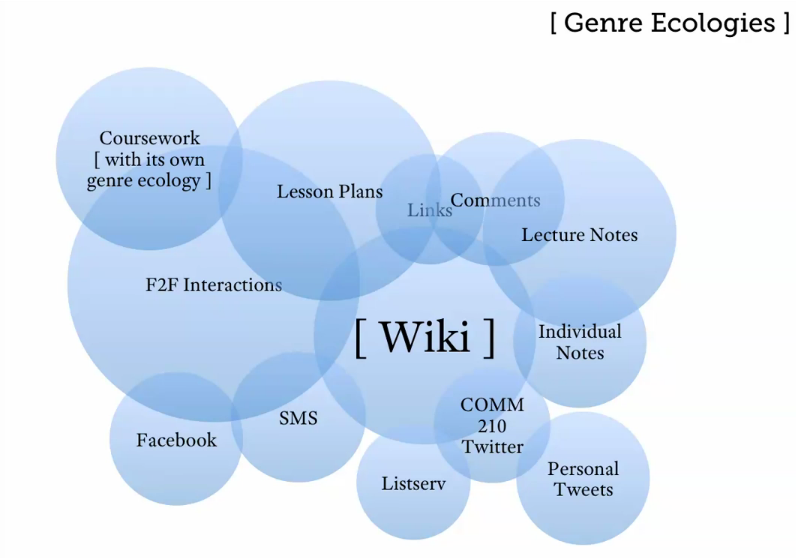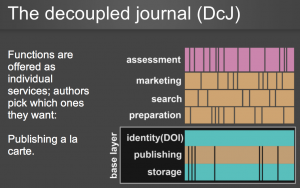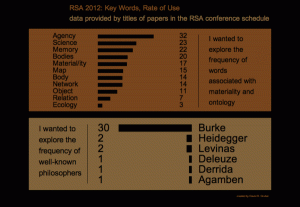It occurs to me that another nice feature of mecology is that it lends itself to pluralization as wecology, and that actually, my discussion of Twitter earlier this week is a perfect example of what I mean by that particular neologism. Whether or not a body chooses to adopt or engage Twitter doesn’t mean that they have the option of abstaining without effect. Along similar lines, it’s why I always request presentation technologies at conferences whether or not I plan to use them–the more people who file such requests, the more likely it is that everyone will have access to them. The intensity of the conference setting (and I’d include the couple of weeks leading in and following it) is a nice place to observe and consider how an organization and/or community trace out their interactions with various media.
I was thinking of this in particular today as I finally caught up to @bmcnely’s RSA talk: Graduate Assistant Professionalization: Reframing Identifications via Networked Writing Practices (http://vimeo.com/42899860). Although he describes this as a genre ecology, the following slide is a nice example of what I think of when I muse on wecologies:
The one thing that a Venn diagram doesn’t necessarily communicate is how a change in one place ripples off to affect other components (to be fair to Brian, he talks about this too, so I’m not critiquing here). To borrow my example from earlier, investing energy in a peer-reiewed conference proceedings has an effect on the modalities of the conference itself. With a deadline set at the conference, the organization encourages presenters to do this work in advance of the event. This probably results in more folks submitting for the proceedings, but it also most likely results in papers that are written to be read rather than heard. Given a choice (albeit one that isn’t strictly forced) between a more engaging presentation and a double peer-reviewed publication, most folk will choose the latter, for reasons that have to do with the broader institutional wecology that most of us participate in.
I’ve been thinking lately about moving in the opposite direction too, though. Rather than tracing back the factors that led to the status quo, what would it mean to make some changes? I packed a Sharpie for RSA so I could add my @handle to my nametag, but adding it to nametags and/or the program would require making changes to the submission process, either at the application or acceptance stages. Easy enough to do, but it requires thinking ahead, by exactly those people who have a lot of other concerns on their plates as they prepare for the conference. I find that there are a lot of great ideas in the air about how to improve conference-going, but those ideas usually circulate during the conference, 8-12 months too late 🙂 For a long time, back in the days of my old blog, there was an annual carnival about “how to make our national conference better.”
Another talk that has sparked my thought in this direction comes courtesy of @jasonpriem, whose work on alt-metrics for scholarly work is something that I’m finding pretty fascinating. Here’s another slide (from a talk he delivered at Purdue recently), about the idea of the decoupled journal:
The idea here is that our journals and presses are responsible for all of these different stages or practices, with incredible duplication of effort, and little difference among them: “Every journal does every function itself. Each produces the same product. Little variety; little choice: publishing as a fixed-price menu.”
[As a sidenote: you might think that this would be perfectly obvious to someone whose book is arguably a 200+ page exploration of what writing might look like if you thought about it as “decoupled,” an ecology of practices rather than a single, vertical “process.”]For me, this is what’s potentially radical about ideas like CommentPress and DHNow, the idea that some of these services might simply try to accomplish one or more of these different layers really, really well, and partner with presses to make the publication process more openly accessible, nimbler, and more effective for a lot of the players involved. And I say that not just as someone whose own process was abnormally looong, but as someone with a genuine belief that this could change this particular game for the better.
Let’s circle it back around. What if a conference proceedings went through a more decoupled process? Let’s say that presenters were allowed to submit their presentations to a protected archive, that could handle not only pdfs but audio, video, slides, et al. And that the selection process were crowdsourced, where conference attendees were allowed to discuss the various possibilities, and then given a number of votes to distribute among the presentations that they felt were worthy of inclusion. And that those papers selected were permitted some revision time post-acceptance? It would be easy enough to set up some structural constraints, so that the entire proceedings wasn’t simply a compilation of the most popular topic(s). Would the result necessarily be worse than having a small handful of people read every single submission and choose among them? I don’t know.
I do know, though, that what would be left over would be a really intriguing body of work, most of which otherwise is basically disposed of after the selection process. So when folks interested in this kind of work, provided here by @davidgruber,
want to do some analysis, they have a lot more to work with than simply titles or even titles and abstracts. (I’m one of those interested folks, btw.) I do think that we’re slowly moving towards a culture where work like this is more possible–I think those folks who are using Twitter are increasingly taking responsibility for their own marketing, and are more inclined to share their work as a consequence. As the utility and availability of alt-metrics grows, so too will its credibility, even with the more conservative niches in our institutions.
But yeah, thinking ahead. Figuring out (or at least educating our guesses about) how these ideas might fit with our current practices–that’s what wecology has been prompting in me lately.
Coming soon: entries on tweecologies (hipster ecosystems), the hauntological implications of bansheecologies, and the oh-so-meta ecologycologies.
Or not.



Article Comments